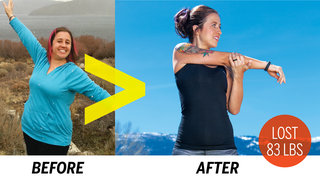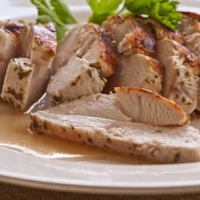Lose Weight > Weight Loss Tips > Weight Loss Articles > Lap-band Surgery: Food Choices Dictate Success
Lap-band Surgery: Food Choices Dictate Success
Lap-Band surgery has become increasingly popular as a treatment option for people who suffer from obesity. Patients often choose adjustable gastric banding over procedures such as gastric bypass surgery or a sleeve gastrectomy because the Lap-Band procedure can be reversed, whereas other bariatric procedures cannot.
How much weight you lose with the Lap-Band, and how quickly you lose the weight, depends on your behavior. By design, gastric banding surgery limits how much food you can eat and promotes a feeling of fullness by essentially reducing the size of the stomach. Using laparoscopic instruments to access the abdominal cavity, the surgeon places an adjustable silicone band around the upper portion of the stomach, which reduces the stomach opening and creates a much smaller "food pouch" than before. The band is lined with a kind of balloon, which is filled with a saline solution during the procedure to tighten the band on the stomach. The operation decreases the amount of food the patient needs to eat to feel full and also slows down digestion, so patients feel full longer. Not surprisingly, most Lap-Band patients eat less after undergoing the procedure and ultimately lose weight.
Although the results are far from instant, for an obese person they can seem remarkable, since weight loss generally begins right away and occurs steadily over a period of months.
"Weight loss with the Lap-Band is virtually guaranteed," notes Minnesota Lap-Band surgeon Dr. William Lee, "but patients still need to participate in the process." The general dietary guidelines are for Lap-Band patients to eat three modestly-sized healthy meals each day, avoid snacks, and stick to low-calorie drinks, like water and sugar-free tea or fruit flavored drinks. Getting at least minutes of physical activity each day, like walking, jogging or swimming, will also promote weight loss.
"By following these guidelines, the average patient can expect to lose up to two pounds per week," says Dr. Lee. For many patients, this means they will lose anywhere from half to all of their excess body weight during the first year after having Lap-Band surgery.
Beyond the general guidelines, some medical sources offer more specific rules to help Lap-Band patients achieve and maintain a healthy weight. Experts not that although gastric banding surgery limits the amount a person can eat comfortably at any given meal, they can still consume a high number of calories and fat grams by eating foods in small portions, or by eating foods that are high in fat and calories. For those wanting to shed excess weight and keep it off, the following foods are ill-advised when eaten in high quantities:
- High-sugar foods, like cookies, candy, ice cream, syrups and sugary beverages
- Fat-heavy foods, including fried food, bacon, sausage, pie, cake, pastries, chips and chocolate
- Fats, such as oil or butter
- Foods made with white flour, including breads, muffins and pasta
In addition, experts recommend that weight loss surgery patients steer clear of alcoholic beverages. Aside from often being high in calories, they have a more potent effect on bariatric patients than other people, because of the changes made to the digestive system.
For the same reason, high-fiber foods are often ill-advised for Lap-Band patients. Although fibrous foods like celery, apples, broccoli, and asparagus are healthful, these fruits and vegetables - especially when eaten raw - can get stuck in the smaller stomach opening created during surgery. The level of complications varies, but many patients say they also have difficulty digesting hamburger, steak, popcorn, and nuts.
These points are simply reminders that weight loss with the Lap-Band, though almost inevitable, can often be a system of trial and error for a patient who is trying to find a diet that works. Most efforts in this department are guaranteed to pay off, but it is always advisable to consult a physician during this learning curve.
How much weight you lose with the Lap-Band, and how quickly you lose the weight, depends on your behavior. By design, gastric banding surgery limits how much food you can eat and promotes a feeling of fullness by essentially reducing the size of the stomach. Using laparoscopic instruments to access the abdominal cavity, the surgeon places an adjustable silicone band around the upper portion of the stomach, which reduces the stomach opening and creates a much smaller "food pouch" than before. The band is lined with a kind of balloon, which is filled with a saline solution during the procedure to tighten the band on the stomach. The operation decreases the amount of food the patient needs to eat to feel full and also slows down digestion, so patients feel full longer. Not surprisingly, most Lap-Band patients eat less after undergoing the procedure and ultimately lose weight.
Although the results are far from instant, for an obese person they can seem remarkable, since weight loss generally begins right away and occurs steadily over a period of months.
"Weight loss with the Lap-Band is virtually guaranteed," notes Minnesota Lap-Band surgeon Dr. William Lee, "but patients still need to participate in the process." The general dietary guidelines are for Lap-Band patients to eat three modestly-sized healthy meals each day, avoid snacks, and stick to low-calorie drinks, like water and sugar-free tea or fruit flavored drinks. Getting at least minutes of physical activity each day, like walking, jogging or swimming, will also promote weight loss.
"By following these guidelines, the average patient can expect to lose up to two pounds per week," says Dr. Lee. For many patients, this means they will lose anywhere from half to all of their excess body weight during the first year after having Lap-Band surgery.
Beyond the general guidelines, some medical sources offer more specific rules to help Lap-Band patients achieve and maintain a healthy weight. Experts not that although gastric banding surgery limits the amount a person can eat comfortably at any given meal, they can still consume a high number of calories and fat grams by eating foods in small portions, or by eating foods that are high in fat and calories. For those wanting to shed excess weight and keep it off, the following foods are ill-advised when eaten in high quantities:
- High-sugar foods, like cookies, candy, ice cream, syrups and sugary beverages
- Fat-heavy foods, including fried food, bacon, sausage, pie, cake, pastries, chips and chocolate
- Fats, such as oil or butter
- Foods made with white flour, including breads, muffins and pasta
In addition, experts recommend that weight loss surgery patients steer clear of alcoholic beverages. Aside from often being high in calories, they have a more potent effect on bariatric patients than other people, because of the changes made to the digestive system.
For the same reason, high-fiber foods are often ill-advised for Lap-Band patients. Although fibrous foods like celery, apples, broccoli, and asparagus are healthful, these fruits and vegetables - especially when eaten raw - can get stuck in the smaller stomach opening created during surgery. The level of complications varies, but many patients say they also have difficulty digesting hamburger, steak, popcorn, and nuts.
These points are simply reminders that weight loss with the Lap-Band, though almost inevitable, can often be a system of trial and error for a patient who is trying to find a diet that works. Most efforts in this department are guaranteed to pay off, but it is always advisable to consult a physician during this learning curve.
Related Articles
-
Fat Burning Furnace - Losing Fat is a No Brainer When You Know the Facts!
How to Lose 26 Pounds in 7 eeks! Do you think that losing fat is diffi
-
Being Trapped in the BAGGIES!
Remember when you weighed over 300 pounds and you literally felt “st
-
HCG diet-one of the well known method of losing excess fat.
HCG diet is one of the well known methods of losing excess fat. HCG is
-
Oral HCG vs. HCG Shots: Which HCG Treatment is better for you?
When Dr. Simeons first discovered the process the HCG hormone undergoe
-
Diversify Your Joy to Lose Weight
As a weight loss coach, one of the first questions I ask most clients
-
How To Lose Weight Quickly In 7 Days
There are gradual ways of losing weight and there are quicker means of
- DON'T MISS
- Find The Right Weight Loss Centre In Renton
- Todays Diets - Whats Hot!
- How Green Tea Can Help You Shed Weight
- Weight Loss Diet - Lose Weight Fast Before the Holidays Arrive!
- How to Lose Belly Fat With Protein
- Propolene Capsules
- Would Insanity run For Me?
- Natural Weight Loss Supplements ?Appetite Suppressants
- Fat Burning Furnace Diet
- Muscle Building Amino Acids




